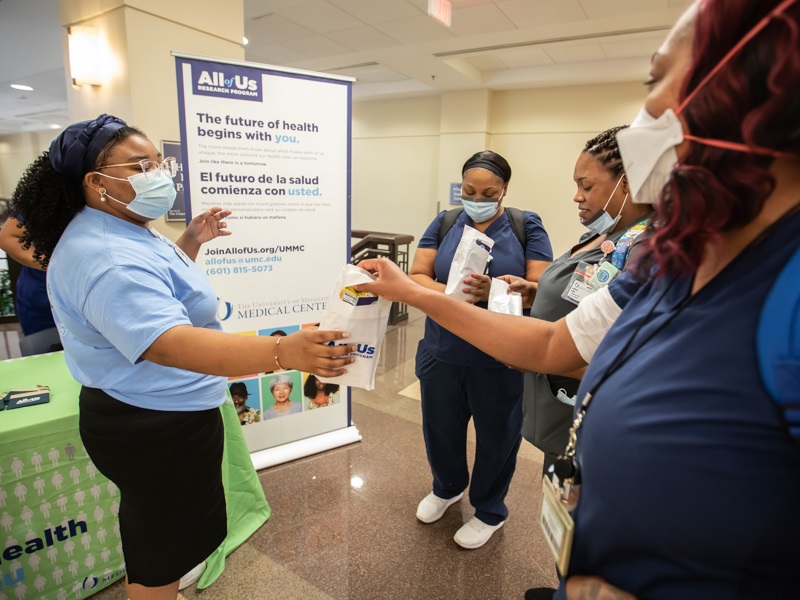
NIH’s $9.7 million grant fuels 26 pioneering projects within the All of Us Research Program, driving diverse analyses and tool development across health domains. These initiatives, supported by ten NIH entities, aim to expedite medical breakthroughs. The projects encompass investigations into chronic pain, cardiovascular risk, mental health, and cancer. They pave the way for innovative methodologies and advanced data tools, propelling transformative discoveries.
The National Institutes of Health (NIH) allocated $9.7 million to catalyze groundbreaking research through 26 two-year projects within the All of Us Research Program. These projects prioritize tool development and novel analyses, spanning various disease areas. Spearheaded by multiple NIH Institutes, Centers, and Offices (ICOs), these initiatives mark a concerted effort to advance medical research and leverage participant data effectively.
The National Institutes of Health (NIH) has allocated $9.7 million across 26 pioneering projects aimed at harnessing the expansive dataset from the All of Us Research Program to drive high-priority research endeavors.
This substantial funding injection will fuel a range of two-year initiatives focusing on tool development and innovative analyses, spanning diverse disease domains. Supported by ten NIH Institutes, Centers, and Offices (ICOs), these projects signify a concerted effort to propel medical research forward.
Sheri Schully, Ph.D., deputy chief medical and scientific officer of All of Us, highlighted the significance of participant contributions, emphasizing, “We are facilitating research advancements by fostering the creation of cutting-edge tools. These tools will enable the exploration of data, ultimately expediting numerous medical discoveries. The comprehensive support from across the NIH has been instrumental in constructing a robust research platform capable of catalyzing transformative findings.”
The projects encompass investigations into various health conditions, such as chronic pain, cardiovascular risk factors, mental health, and cancer. Some initiatives are centered on refining research methodologies or devising sophisticated data analytics tools.
Hailing from over 20 institutions, the 26 selected projects include noteworthy endeavors such as:
– “Elucidating Social Determinants And Mental Health Needs To Achieve Equity In Rheumatic Disease Care” from Brigham and Women’s Hospital.
– “Germline Genetics And Risk Of Prostate Cancer In Diverse Populations From The All of Us Research Program” from Fred Hutchinson Cancer Center.
– “Assembly And Re-Alignment of HLA Genomic Region and its Implication for Fine-Mapping Suicidality in African Descent Population” from Henry Ford Health and Michigan State University Health Sciences.
– “Identifying Genetic and Sociodemographic Determinants of Susceptibility to Infectious Diseases in Diverse Population Groups” from Icahn School of Medicine at Mount Sinai.
– “Real-World Data Estimates of Racial Fairness with Pharmacogenomics-Guided Drug Policy” from Johns Hopkins University.
After the two-year funding period, the tools generated through these projects will be accessible to researchers through the All of Us Researcher Workbench.
This recent funding amplifies the ongoing efforts of All of Us’ Extramural Program to Advance Research (EPAR). The previous year witnessed the sponsorship of 25 research teams tasked with integrating All of Us data into existing projects. EPAR awardees have effectively contributed to establishing a nationwide collaborative network for researchers. They utilize the All of Us Researcher Workbench to solve challenges, share insights, and refine methodologies, thereby bolstering All of Us’ suite of resources and tools.
Schully emphasized, “The Researcher Workbench, operational for three years, continues evolving with additional data and features to foster deeper insights into health and disease. Through EPAR, we’re fostering impactful strides in medical research.”
Funding for the latest round of awards was sourced from various entities, including All of Us and several NIH branches like the National Eye Institute, National Heart, Lung and Blood Institute, National Human Genome Research Institute, and others.
Moreover, in a recent development, the All of Us Research Program allocated $30 million to the University of Colorado Anschutz Medical Campus. This funding aims to establish the Center for Linkage and Acquisition of Data, dedicated to integrating new data streams with existing participant data. The center’s focus includes acquiring mortality and claims data, along with environmental information from the Centers for Disease Control and Prevention’s Environmental Justice Index. This initiative aims to augment data completeness and utility within the All of Us Researcher Workbench for clinical research endeavors.
These comprehensive efforts strive to bridge information gaps within the All of Us dataset, enhancing its value and utility for clinical and research purposes.
The recent $9.7 million funding injection by NIH strengthens All of Us’ endeavors in advancing medical research. These initiatives, complemented by the Extramural Program to Advance Research (EPAR), foster collaboration, refine methodologies, and bolster tools within the All of Us Researcher Workbench. Additionally, the $30 million allocation to establish the Center for Linkage and Acquisition of Data amplifies efforts to enrich participant data. These collective endeavors aim to bridge information gaps, enhancing the program’s utility for clinical research and propelling transformative discoveries in healthcare.

